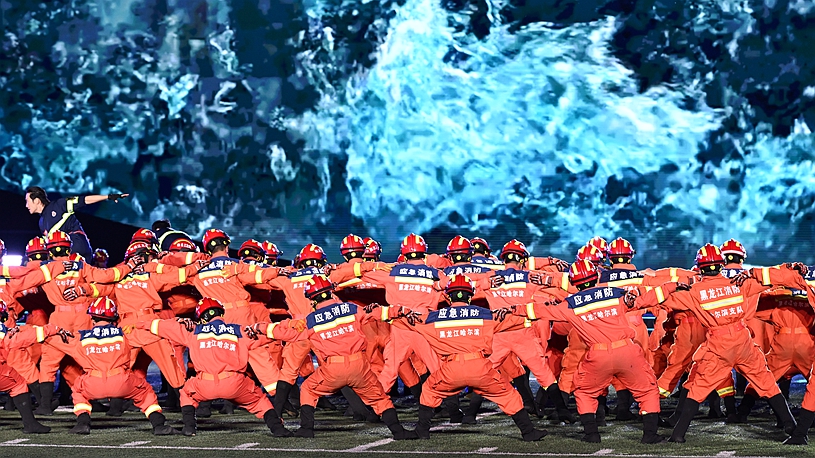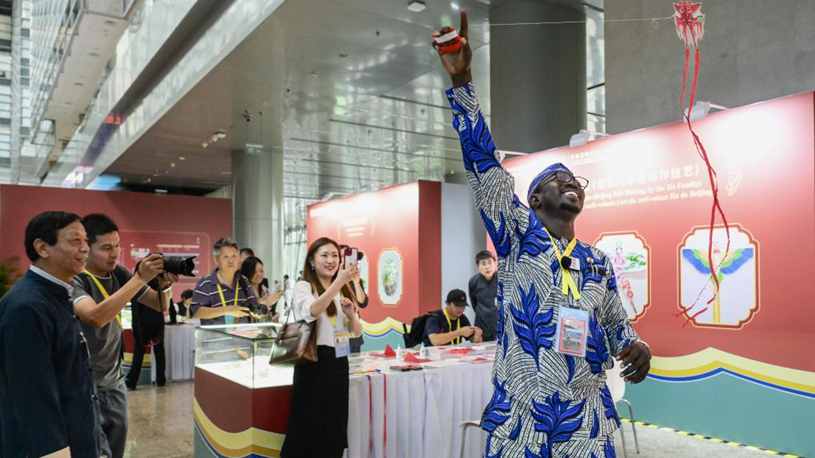* China's Gen-Z athletes made headlines at the Paris Olympics in a wider variety of sports as the young generations now enjoy access to a broader range of athletic opportunities.
* Economic growth, social media and changing parental attitudes are driving this change, allowing the young generations more opportunities for self-expression.
* This surge in interest has also spurred growth in related industries, particularly in equipment manufacturing and sport training.
BEIJING, Sept. 8 (Xinhua) -- Eighteen-year-old Deng Yawen won gold in the women's freestyle BMX competition on July 31 at the Paris Olympics. Just days later, fellow 18-year-old Liu Qingyi, or B-Girl 671, earned a bronze medal as breakdancing made its Olympic debut. Meanwhile, 11-year-old skateboarder Zheng Haohao wowed audiences with her first Olympic appearance, becoming the youngest athlete to compete at the Paris Games.
The emergence of these young Chinese Olympians highlight how the country's younger generations are embracing a wider variety of sports - well beyond China's traditional strengths in disciplines like diving, weightlifting and shooting.
In the past, many of China's athletes were selected, trained at boarding schools, and groomed for Olympic success in specific sports. However, thanks to economic growth and a shifting culture, China's Gen-Z now has access to a broader range of athletic opportunities that previous generations did not have.
INDIVIDUALISTIC LIFESTYLE
At a dance studio in Beijing, B-Girl Wang Yufan moved effortlessly to a pulsating beat, her fluid movements and sharp spins captivating onlookers. Beneath the brim of her low-slung cap, her youthful face exuded a cool confidence. "I do breakdancing because it's cool," said the 18-year-old.
Yuan Shipeng, 37, manager of the ROD Backstreet Dance Club where Wang trains, used to dance on Beijing's streets over a decade ago. After graduating from university, he founded his first dance club.
"At that time, it was tough to attract students. In nine months, I only recruited four students," Yuan recalled.
However, things have changed in recent years, as younger generations have begun to embrace a more individualistic lifestyle. "As those born in the 1980s and 1990s have grown up and become parents, they are more open to respecting individuality and allowing their children to try new sports," Yuan explained.
Like breakdancing, climbing is also gaining popularity among China's youth. Xie Yishan, editor at the China Mountaineering Association magazine, noted that there is a booming competition scene for both amateurs and professionals.
"A local competition can see several hundred children participate, with record numbers of participants each year," she said.
Xiao Lin, a 12-year-old student who lives in Shanghai, has been learning climbing for two years. "Climbing helps build one's willpower and enhances thinking skills, especially on more challenging walls where you need to figure out your own route," he said.
Skateboarding, a sport once considered rebellious, has also surged in popularity over recent years.
According to the Shanghai Skateboarding Team, the city now has over 470 registered skateboarders, with nearly 200 new registrants added last year alone. Nationwide, there are more than 400 skateboarding clubs.
"In the past, many people thought skateboarding was an unserious and unsafe sport. But as skateboarding culture has developed in China, more and more people are realizing that it is actually safer than sports like football or basketball," said Li Yajie, an amateur skateboarder.
Social media has played a key role in promoting these sports among younger generations, who are eager to express their personalities by sharing their experiences.
By 2023, there were over 650,000 posts about rock climbing on Xiaohongshu, an Instagram-like platform. Over the past four years, the number of these posts has grown nearly 30-fold.
Government support has also played a crucial role. Unconventional sports like climbing and skateboarding have been included in the physical education and health curriculum in several provinces, reflecting a broader acceptance of these sports in children's education.
RIPPLE EFFECT
This burgeoning interest has naturally stimulated related industries, particularly in equipment manufacturing and sport training.
According to the China Mountaineering Association, the number of climbing gyms on the Chinese mainland reached 636 in 2023, a 31 percent increase on the previous year. Shanghai leads with nearly 70 gyms, followed by Beijing with over 50.
A report released by China's e-commerce giant JD.com also indicates that in the first half of this year, transaction volume for climbing chalk, helmets and shoes increased year-on-year by 151 percent, 42 percent and 40 percent respectively, while transaction volumes for surf swimsuits, leashes and surfboards grew by 473 percent, 175 percent and 40 percent respectively.
Two decades ago, China was often referred to as a "tennis desert," with the sport being largely inaccessible due to costly equipment, limited courts and a scarcity of qualified coaches.
Today, with per capita GDP exceeding 12,000 U.S. dollars, the number of tennis enthusiasts has ballooned to over 20 million in China, according to the International Tennis Federation.
The rise of Zheng Qinwen, who won women's singles gold at the Paris Olympics, is fueling further market growth in China.
"After her win, my social media feed was flooded with congratulations, even from people who aren't usually interested in tennis," said Liu Fengning, a board member of the China Tennis Association.
"The next day, I was inundated with inquiries about court bookings, training programs and professional development from both parents and aspiring youths."
A tennis club manager in Hangzhou said that their courts remained illuminated well into the night to accommodate eager participants.
Consumer behavior reflects this growing interest. On Tmall, a prominent e-commerce platform, over 3,000 people added the same model racket used by Zheng Qinwen to their shopping carts within two days, leading to a more than 2,000 percent year-over-year increase in sales.
But despite the allure of the Olympics, most parents have no plans to train their children to become professional athletes. Instead, they prefer their children to develop a healthy hobby.
In Guangzhou, a mother surnamed Qi takes her son to a skateboarding training center two to three times a week. "After watching the Olympics, he told me he wants to be like skateboarder Zheng Haohao and compete one day," she said. "While I don't plan for him to go down a professional path, I'm pleased to see him have a hobby and stick with it."
With support from families, the government and an expanding industry, the future of sports in China seems poised to evolve even further. Whether it's on a BMX bike, skateboard or tennis court, the next generation of athletes is ready to carve out new paths - each driven by a unique blend of personal style, dedication, and the thrill of pushing boundaries.
(Video reporters: Qin Guanghua, Huang Kaiying, Shen Nan, Niu Mengtong; Video editors: Hong Liang, Liu Xiaorui, Hong Yan, Roger Lott, Lin Lin) ■











